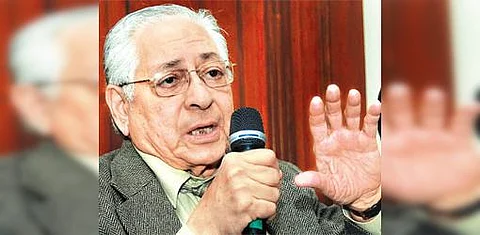

"Lawyers in India never retire; they simply drop dead", remarked Fali Nariman. They are then hardly spoken about or remembered, save in rare cases where while we grieve at their departure, we recall and extol their lives and careers.
Soli Sorabjee is certainly among such notable exceptions - one of the all-time greats both as a lawyer and a human being. His passing has created a great void and unkindly reminded us of the proximity of death to life - one so full, rich and meaningful.
Born on 9 March 1930, graduating in economics from St Xavier's College, he did law at the Government Law College, Mumbai where among his teachers were the illustrious Nani Palkhivala and Yeshwant Chandrachud, later Chief Justice of India.
He started the general practice of law in 1953 in the chamber of the legendary Sir Jamshedji Kanga, where his immediate senior was Khursedji Bhabha who chiselled the young juniors. Among others under Bhabha’s pupilage then was Fali Nariman.
Soli soon started appearing and arguing in the Supreme Court even in the late 1950s, particularly cases involving questions of constitutional law. As a young lawyer in the mid-1960s appearing in the Supreme Court, Sorabjee found the court fully in his favour in a case.
But there was a judgment that squarely covered the case against him. He expected the opposite side to cite it, but they did not. Sorabjee then cited the case and tried to distinguish it but did not succeed. The case was decided against his client but he earned the goodwill of the Bench and a high reputation for fairness.
Years later, as Attorney General speaking at the obituary reference to Chief Justice Sabyasachi Mukharji, he said quoting Carlyle that tradition is an enormous magnifier, but traditions are not like instant coffee, each generation would have to imbibe and cherish them.
He did and taught others to do so. Teachers and seniors should lead and teach by example. Soli lived this; his chamber was a nursery for training a large number of distinguished men of law. In his long and eventful career, he appeared in a number of landmark cases and helped lay down the law.
When he took over as Attorney General he had said that he did not see his role as that of a 'hatchetman' of the government of the day. His mentor Palkhivala, greeting him on his appointment, had said the same about his role - the guardian of public interest and the protector of human rights. He could be critical of the government whose principal law officer he was, much like his eminent predecessor Motilal Setalvad.
Soli was a sound lawyer and a skilled advocate. He was deeply rooted in legal theory. He was always very polite but firm. Gentle in manners, unfailingly courteous and polite, he was grace personified.
Great liberality of thought, catholicity of outlook combined with sturdy independence, total fairness, objectivity and impartiality were his hallmarks. Hero of many battles and celebrated causes, he was a noble warrior who bore his scars and honours with philosophic indifference.
It may be said that he brought to bear a moral eminence on a highly mercenary and at times unprincipled legal profession. He could take a principled stand on any question or case. He was a strong and outstanding ethical pillar of the Bar.
With his departure, the tribe has further dwindled. He believed that to preserve basic values, everyone - whether he be a public functionary or a private citizen - should display a degree of vigilance and willingness to sacrifice. He himself was an exemplar.
In an atmosphere where the pursuit of the higher and nobler ideals of the legal profession is becoming increasingly difficult and where half-baked ideas reared by accident have sway, Soli Sorabjee belonged to a refreshingly different genre.
He was a cultivated man, to use Frankfurter’s felicitous expression. Literature and music were his soulmates. The man was as great as the lawyer - an extremely gracious person. His claim to eminence rests as much on his great humanity and urbanity.
A monk dedicated to the service of the leprosy afflicted had sought Sorabjee’s help in some legal matter. When he went to meet and thank the lawyer, Soli gave him a cheque for a munificent sum as his own contribution to the noble cause.
He has been, to me, a very dear and revered friend, philosopher and guide for about four decades. When I called to greet him on his birthday on March 9, Mrs Sorabjee answered the call and said he was not feeling good and that she would convey to him my greetings.
I did not want to disturb him thereafter, having regard to his health. But my great regret is that I will never be able to speak to him again. As he said with reference to Daphtary, I will have to wait till I get to the other shore and meet him. O for the touch of the vanished hand / And the sound of a voice that is still!
Carlyle wrote that a well-written life is almost as rare as a well-spent one. Soli Sorabjee’s life was truly well-lived. While the West is still lighted with his radiance, it is good for us to imbibe his lessons. Goodbye sir, may the flight of angels lead you to your eternal rest and may your legacy abide with us.
(The writer is an expert on constitutional law and can be contacted at vsudhishpai@gmail.com)